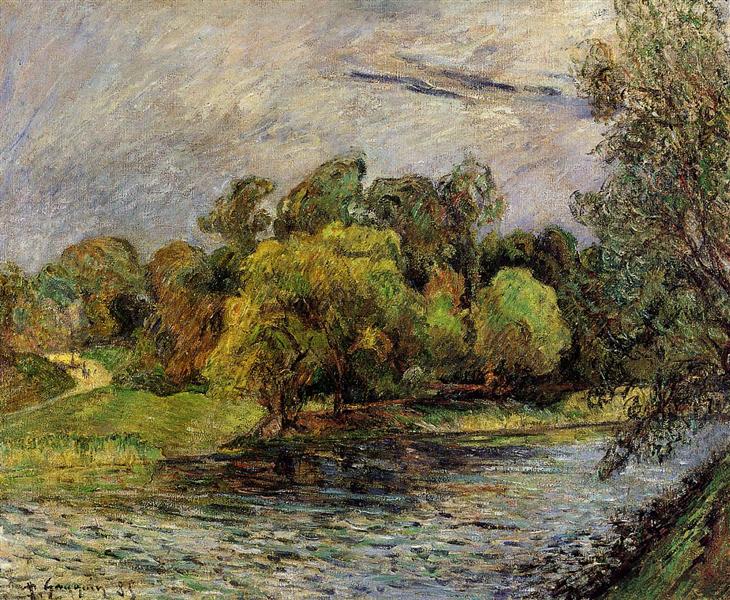Opis
Praca „Park Oestervold - Kopenhagen - 1885” Paula Gauguina jest wspaniałym przykładem wczesnego dzieła artysty, przed jego ewolucją w kierunku najbardziej syntetycznych stylów, które zdefiniowałyby jego tylną karierę. Ten olej na płótnie oddaje wrażliwość i uwagę środowisko parku, pokazując aspekt guguin, który troszczy się o reprezentację życia codziennego w kontekście nordyckim.
Na tym obrazie kompozycja charakteryzuje się podejściem do przestrzenności i interakcji postaci w środowisku naturalnym. Rozmieszczenie form ujawnia staranną równowagę między bujną roślinnością a postaciami ludzkimi, które oddziałują z ich środowiskiem, ustanawiając dialog między naturalnym a człowiekiem. Roślinność, utworzona przez drzewa i krzewy, które opracowują scenę, zapewnia poczucie głębokości i ruchu, który zachęca widza do wejścia na scenę. Na pierwszym planie postacie są naturalnie prezentowane, przedstawiając momenty wolnego czasu i socjalizacji.
Paleta kolorów w „Oestervold Park” rezonuje z ziemskimi i zielonymi niuansami, dowodząc zdolnością Gauguina do uchwycenia światła i atmosfery dnia w parku letnim. Ciepłe odcienie, wraz z subtelnymi kontrastami między światłami i cieniami, przyczyniają się do stworzenia przytulnego i zabawnego środowiska. Ten chromatyczny wybór jest charakterystyczny dla stylu post -impresjonistycznego Gauguina, który koncentrował się na emocjonalnej ekspresji koloru, ale nadal pozostaje w tej pracy w bardziej naturalistycznych ramach w porównaniu z jego kolejnymi pracami, w których eksperymentowałby z bardziej odważnymi i symbolicznymi kolorami.
Jeśli chodzi o liczby, choć bardziej stylizowane i mniej szczegółowe niż w ich późniejszej pracy, są one wyraźnym odzwierciedleniem życia miejskiego i społecznego Kopenhagi w XIX wieku. Dzięki swoim pozycjom i gestom postacie wydają się być w trakcie bogatej interakcji, tworząc poczucie wspólnoty i życia codziennego. Jednak użycie płaszczyzny perspektywicznej i merytorycznej, w połączeniu z naturą, podkreśla izolację i introspekcję, które można znaleźć w zatłoczonych przestrzeniach publicznych.
To zdjęcie jest zarejestrowane w produkcji Gauguina na etapie, w którym zaczął definiować swój styl, wciąż naznaczony impresjonizmem, chociaż już szuka bardziej osobistego i symbolicznego podejścia. Wpływy impresjonizmu są widoczne w trosce o światło i kolor, ale artysta uprawił już zainteresowanie długą tradycją malarstwa na świeżym powietrzu, spopularyzowanym przez jego współczesnych.
Praca jest także przejawem poczucia poczucia Gauguina do przynależności do jego środowiska, ustanawiając związek między jego doświadczeniami a kulturowymi osobliwością Danii. Ta relacja między artystą a przestrzenią geograficzną jest niezbędna do zrozumienia nie tylko dzieła, ale także rozwoju samego Gauguina jako jednego z odniesień sztuki post -imprespression i jego późniejszego poszukiwania bardziej symbolicznego wyrażenia w miejscach takich jak Tahiti.
Podsumowując, „Oestervold Park - Kopenhaga - 1885” można rozumieć jako refleksję na temat współczesnego życia w naturalnej przestrzeni, zachowując subtelność i piękno codziennej chwili. Ta praca otwiera serię badań, które Gauguin nosiłby przez całą swoją karierę, potwierdzając jego wyjątkową zdolność do przeplatania elementów natury z ludzkością, dualność, która nadal rezonuje w świecie sztuki do dziś.
KUADROS ©, słynna farba na ścianie.
Ręcznie wykonane obrazy olejne, z jakością profesjonalnych artystów i charakterystyczną pieczęcią KUADROS ©.
Usługa reprodukcji zdjęć z gwarancją satysfakcji. Jeśli nie jesteś w pełni zadowolony z repliki twojego obrazu, zwrócimy twoje pieniądze w 100%.

